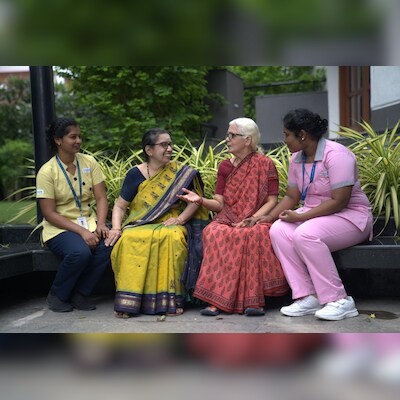)
The United Nations Population Fund (UNFPA) further projects that this population will rise to 319 million by 2050.
The Indian senior care market is seeing a push into Tier-II cities like Lansdown, Navsari, and Coimbatore, with a wide range of ‘out of hospital’ services gaining traction, from basic bedside caregiver services and allied services to full-fledged post-hospitalisation care, palliative care, and dementia care.
According to a recent NITI Aayog report on the state of senior care in India released in February 2024, the size of the senior care industry in India is about $7 billion, having grown rapidly in the last five years.
Experts believe that a major reason for the rise of this sector in Tier-II cities is the emergence of Tier-I cities like Delhi, Mumbai, and Bengaluru as hubs for employment and education, leading to a substantial migration of younger generations to larger urban centres.
A geriatric specialist associated with one of India’s top hospital chains said that while this migration has improved the financial status of many families, it has also left elderly parents in smaller cities without the traditional support systems that would have been provided by their children.
“The absence of immediate family members to care for ageing parents has created a demand for professional eldercare services, with families increasingly seeking options such as assisted living facilities, home healthcare services, and specialised medical care for the elderly,” she added.
With India’s population of senior citizens (aged 60 or above) expected to reach an estimated 194 million by 2031 from 103.8 million, according to Census 2011, combined with a fall in fertility rates, the market is expected to see further demand in India.
The United Nations Population Fund (UNFPA) further projects that this population will rise to 319 million by 2050.
Cost a big reason for people opting for out-of-hospital senior care: Experts
While increasing life expectancy and the migration of younger generations to urban centres for employment are the major drivers of senior care growth in Tier-II cities, experts also claim that out-of-hospital care can help provide a cost-effective care environment for senior citizens.
Commenting on this claim, Asheesh Gupta, founder of Samarth Eldercare, said that out-of-hospital healthcare not only relieves the pressure on the overburdened healthcare infrastructure but could also reduce the total cost significantly and enhance the quality of experience for the elderly.
“Data accessed by Samarth from the United States indicates that out-of-hospital geriatric health care has actually reduced hospitalisations by 35 per cent and emergency visits to hospitals by 51 per cent for patients using it consistently,” he added.
Highlighting cost as a major reason for people choosing out-of-hospital care, Rajagopal G, group chief executive officer (CEO) of Lifebridge Senior Care, said that based on the assessment of care needs, a thorough care plan is prepared for each elder, which then drives the cost depending upon the complexity of the services that are required.
“The typical average cost of these at-home elder care services in India ranges from Rs 10,000 to Rs 35,000 per month. However, the cost can be higher depending on specific conditions,” Gupta said.
“These costs are certainly much lower than the costs that will be incurred in a hospital environment, which can be anywhere between four to ten times the care cost delivered out of hospital,” Rajagopal G added.
Currently, these expenses are out of pocket, unlike hospitalisation costs, which may be covered by insurance.
The NITI Aayog report on senior care states that the size of the home healthcare market in India, which was estimated at $6.2 billion in 2020, is projected to reach $21.3 billion by 2027, with geriatric care forming a big chunk of this segment.
Tech integration to fuel future growth
Experts believe that the integration of technology in senior care services can play a crucial role in transforming eldercare.
The NITI Aayog report states that since the Covid-19 pandemic, certain product categories have seen massive demand, such as telehealth applications, remote patient monitoring, Internet-of-Things (IoT) products, AI-based home equipment, and assistive technology products, which can have huge potential to transform the lives of seniors.
“Telemedicine, remote monitoring, and online platforms that connect families with caregivers can make it easier for people to ensure that their elderly relatives receive the care they need, even from a distance, especially in the case of Tier-II and III cities,” an expert said.
Gupta added that the integration of technology, such as telemedicine and remote monitoring, has enabled service providers to bridge the accessibility gap and augment their on-ground elder care services to seniors living in every location.
First Published: Sep 01 2024 | 4:18 PM IST
